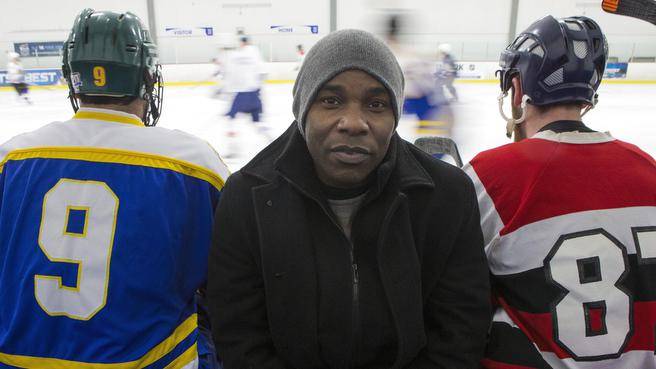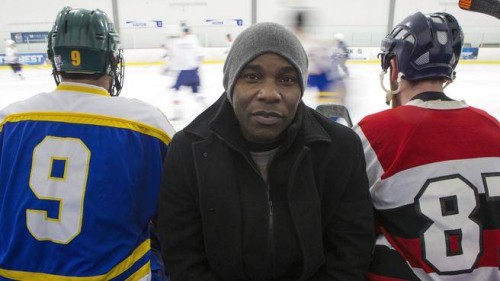
Source: Herald Sports Lauren La Rose The Canadian Press
TORONTO — As Damon Kwame Mason’s childhood love of hockey reignited in his later years, he couldn’t help but notice the lack of visible role models in the NHL.
“That burning question was always in my mind: ‘How come there’s not a lot of black players in this league up until now?”’ recalled the Toronto native, who played organized hockey for two years and grew up idolizing Montreal Canadiens legend Guy Lafleur.
In “Soul on Ice: Past, Present & Future,” the filmmaker explores the involvement of black athletes in hockey from the minors to the NHL. The award-winning documentary delves deeper into the legacy of players who broke racial barriers and overcame tremendous adversity to leave their mark on the game.
Damon will join NHL commissioner Gary Bettman and Capitals owner Ted Leonsis at a private screening of the film in Washington on Jan. 13. Retired NHL stars Grant Fuhr, Anson Carter, Kevin Weekes and Willie O’Ree — the first black hockey player in the NHL — are among the invited guests.
The event will serve as the launch for a variety of NHL activities coinciding with Black History Month in February, and continuing through March with Hockey Is For Everyone Month.
Mason was inspired to further explore the history of black hockey players after moving to Edmonton in 2005, where he worked as a radio announcer. He befriended members of the Oilers, including now-retired Georges Laraque with whom he co-hosted a show.
Mason learned of the Colored Hockey League of the Maritimes formed in Halifax in 1895 — 22 years before the NHL was born.
“I was floored, because at that time I was in my 30s and I thought to myself: ‘If I don’t know this information … how many Canadians don’t know this information? How many black Canadians don’t know this information?
Even Fuhr, a Hall of Fame goaltender, said he had little knowledge of the league and was fascinated by its history.
“I think it shows that hockey has been a diversified game for a long time — it’s just that people didn’t realize it,” said the seven-time all-star, who won five Stanley Cups with the Oilers.
The film also turns its lens on other trailblazers like Herb Carnegie, whom Mason interviewed just over a week before his death in 2012.
Carnegie suited up for the Quebec Aces and could have been the NHL’s first black player. He was invited to the New York Rangers’ training camp in 1948, and was offered chances to play with the team’s farm club which he turned down because the pay was too low, citing discrimination.
The film also reveals the intense racial abuse faced by players like Toronto’s Mike Marson, who was drafted by the Washington Capitals in 1974 and received death threats.
“Imagine you have to focus on the game but you also have to focus on, ‘OK, is someone going to throw a battery at me? Who’s going to yell this and that about me?’” said Mason.
“These are added pressures to a young player of colour — especially back then. Yet still, something else was in the back of their head saying: ”Don’t give up … just keep fighting. We have a dream, we have a purpose, and nobody’s going to stop us.’”
Val James, the first American-born black player in the NHL, credited his family and teammates for encouraging him to persevere.
“Otherwise I probably would have at one point decided, ‘Why should I have to put up with this?“’ said James, who played for the Buffalo Sabres and the Toronto Maple Leafs in the 1980s.
“It didn’t matter where I was: Canada, the U.S. — there was some form of racism being thrown my way.”
The film also chronicles young players like prospect Jaden Lindo. Karl Subban, father of all-star Habs defenceman P.K. Subban, is also featured, as is younger son Malcolm.
The film also features NHL players like Wayne Simmonds of the Philadelphia Flyers and Joel Ward of the San Jose Sharks. Despite increased diversity at the NHL level, neither have been immune from discriminatory acts.
Simmonds had a banana thrown at him during a pre-season game in London, Ont., in 2011. And while playing for the Capitals, Joel Ward was subjected to racial slurs on Twitter after his overtime goal eliminated the Boston Bruins from the 2012 Stanley Cup playoffs. Both players shrugged off the respective incidents.
“They could have yelled, screamed, gave up and said, ‘Forget about it.’ Or they could have said, ‘I’m moving forward and I’m going to continue to score, I’m going to continue to be a winner,“’ Mason said.
“What example is better for our youth than to be a winner and to persevere through adversity.”

